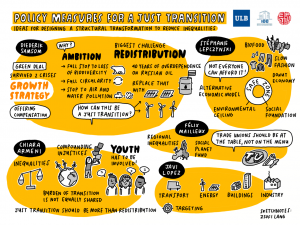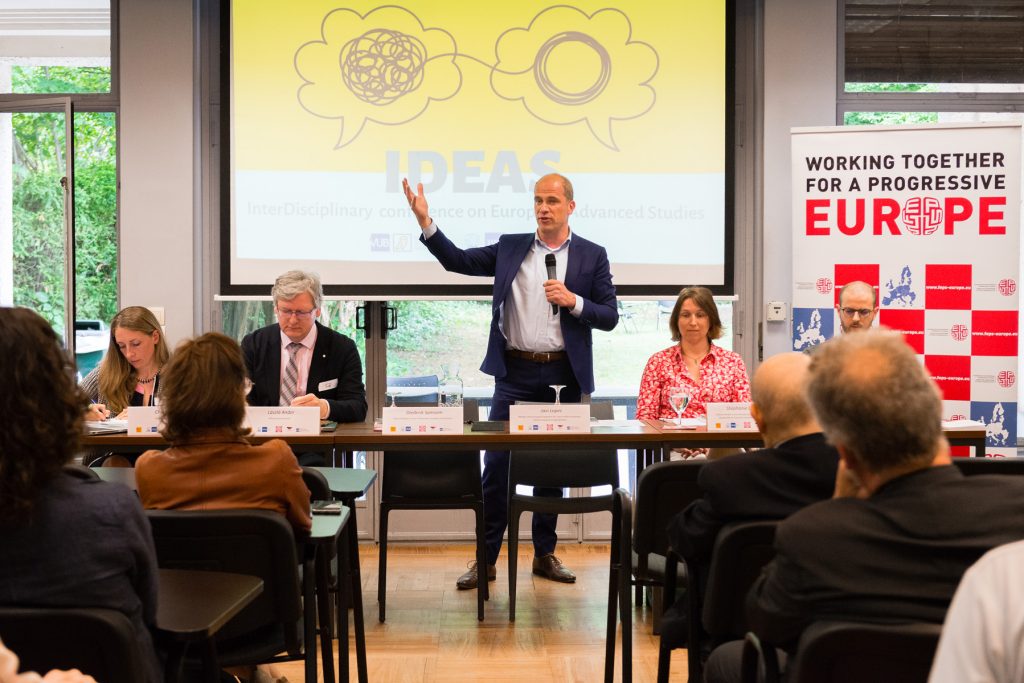Chaired by László Andor, FEPS Secretary General, the discussion started with a keynote by Diederik Samsom (Head of Cabinet of Frans Timmermans, European Commission), followed by a panel discussion with Chiara Armeni, (Professor, Université libre de Bruxelles), Stéphanie Lepczynski (Cabinet member of the Secretary of State, Brussels Capital Region, Responsible for Economic Transition and Scientific Research), Javi Lopez (Member of the European Parliament – ES, chair of PES Environment, Climate Change & Energy Network) and Félix Mailleux (Advisor on Climate, Energy and Industrial Policies, ETUC).
The context
The structural transformation of our economic systems to a state that no longer inflicts harm on climate and environmental systems provides opportunities to also tackle multidimensional inequalities. Some observers have suggested that environmental destruction and increasing inequalities stem from the same causes, policies and ideas.
In this context, inequalities are not only limited to economic issues but can also pertain to unequal access and visibility with regards to decision making in climate policies and to the unequal suffering of adverse effects from the climate crisis and environmental degradation.
Policy discussions in Europe and across the world have started to incorporate the inequality dimension through concepts such as the “just transition” and “climate justice”. Notably, these concepts go beyond compensatory measures and consider the reduction of inequalities as a necessary condition for climate action.
At the EU level, proposals for a Social Climate Fund and Just Transition Mechanism seek to integrate an inequality focused perspective by including policies such as investments in affordable energy and transport systems as well as industrial and labour market policies that aim at providing low carbon employment.
Currently, these initiatives are, however, still being debated and contested. Hence, there is value in further specifying the design and the interplay of policies that can be both environmentally friendly and help reduce inequalities.
A policy shift powered by the young: The European Green Deal
For FEPS Secretary General, László Andor, “The affection of the young generations of voters to the question of environment and climate helped to push climate to the top of the European policy agenda, under the leadership of the First Vice President of the European Commission, Frans Timmermans.
Embodied by the European Green Deal, this policy making shift was defined by Timmerman’s Head of Cabinet, as “an economic plan to provide an aging continent with new momentum, innovation, energy”.
“The story of the European Green Deal is the story of an environmental policy that survived to two of the biggest societal crises you can imagine: a pandemic and a war”, said Samsom.
For him, designing such a policy and making it just is done by creating as many redistribution elements as possible. “Tax those who can pay to redistribute to those who can’t”.
Samsom steated that a Treaty change is not needed to make the European Green Deal happen. “The biggest challenge is about socioeconomic policy. I think we will have the political momentum to make it happen”.
Redistribution is not enough

For ULB Professor Chiara Armeni, a distributive approach to justice is necessary internally and for a geopolitical perspective, but it can be fragile from a justice perspective. “It restricts the scope of justice”, said Armeni.
“Policymaking needs to go beyond redistribution to include intersecting inequalities”, added Armeni.
Stéphanie Lepczynski, Cabinet member of the Secretary of State, Brussels Capital Region, pointed out that “inequality prevents us to move fast and be bold in this transition if we don’t want to let anyone behind. We need an alternative economic model”. As an example, Lepczynski, mentioned the desirability of a stronger consumption of bio foods and slow fashion are preferable, but more expensive. “People with less resources cannot afford them”.
Félix Mailleux, from ETUC, raised attention towards inequalities between regions. The transition out of coal, for instance, he said, will have an impact in some regions; also changes in automotive sectors, with the new “green” jobs potentially ending up in already in better off regions.
In the negotiations, said Mailleux, “Trade Unions should be on the table and not on the menu”.
Finally, MEP Javi López underlined the importance of working on the ‘green’ transition together with other EU Member States. “Doing this (the Green Deal) as a continent is the only way to do it efficiently”. For López, industry, infrastructure, energy and transport are the four pillars the transition must to focus on in order to decarbonize the economy and our socio-economic life.
To conclude, Andor highlighted the growing questioning of the existing economic, social, taxation models and the intensifying calls, if not for immediate transformation, for open discussions about radical shifts in order to achieve a just, sustainable transition.




